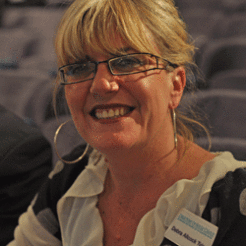Charities spend too much time collecting and measuring data and should rely more on their personal understanding of beneficiaries, Debra Allcock Tyler, chief executive of the Directory of Social Change told a data seminar yesterday.
Allcock Tyler also said that data analysis often did not fit well with the ethos of the voluntary sector.
“A great deal of the time data is pointless,” she said at the event in London, called State of the sector: Where next for the data revolution, and organised by think tank NPC.
"Very often it is dangerous and can be used against us and sometimes it takes away precious resources from other things that we might more usefully do,” she said.
Allcock Tyler said that data was an effective tool for some charities, if used correctly, but that the “vast majority of people” who use and analyse data are not “responsible with data” and are not “good people who are sensible and think things through and understand the broader picture”.
She said most charities did not have the resources or beneficiary numbers to analyse data and should rely on their personal experience instead.
“Data is about choosing where to spend your resources but the thing about the voluntary sector is that the number of charities that have sufficient beneficiaries or sufficient resources to even do any data analysis is absolutely tiny,” she said. “It’s a few thousand charities at the most.”
Allcock Tyler said that there is fundamental mismatch between the conclusions suggested by the cold analysis of data and the ethos of the voluntary sector.
“The data would say to exclude old people from using the NHS and not to extend the life of someone with terminal illness,” she said. “But what drives us in the voluntary sector is not what the data says is logical and sensible but what is the right and human thing to do.”
“The vast majority of good work that is done by good people in this country is done at very very small charities or community groups working on a local basis where they know people,” she said.
“It isn’t the data about Mrs. Jones going to the social centre that matters to that charity – it’s the fact that they know [they are doing a good job] because she smiles. They are not going to count the number of times that she smiles. People at local levels don’t engage in charitable activity because Mrs Jones is going to feel 8 per cent happier.
“I think that’s a key point about charitable endeavour. Data does not drive donor decisions. In fact data does not drive decisions at all. Data can help to explore your feelings but it doesn’t drive decisions.”
'Engage in the dialogue'
Allcock Tyler said charities need to challenge funders that ask for sets of data.
“Never provide data just because a funder asks us for it,” she said. “If somebody says to you ‘give me the evidence’, the first questions you should ask is, ‘what do you want to know? What is it you are trying to find out? Who is going to read it and what are they going to do with it’.
“Because half of the time you are spending all this time, effort and energy trying to produce information that isn’t going to be read by anybody, which isn’t used by anybody but it has just ticked a box. We have got to challenge that.
“It is important that we learn and ask if what we are doing is working and that we don’t have to do it according to somebody else’s tune,” she said. “So engage in the dialogue and put your resources into the places that actually matter.”
But Allcock Tyler said that data can still be a useful part of the picture, if not the whole picture.
“I’m not saying that data can’t be useful – I’m a massive fan of data,” she said. “But when we hook onto it or we see it as being the be all and end all – or we can’t move forward without the data, I think we’re in trouble. Data is just a bit of information.”
Allcock Tyler said DSC has scaled back its monthly data analysis in recent months.
“We have now cut it dramatically down because half of the things that we were measuring, we weren’t actually using or doing anything with,” she said.
“As part of a data revolution thing, it can be incredibly dangerous because people say if you can’t measure it, it’s not worth doing – but actually some things you can’t measure. There is something about the nature of charitable endeavour which is about love and trust and faith and not about numbers and data.”










